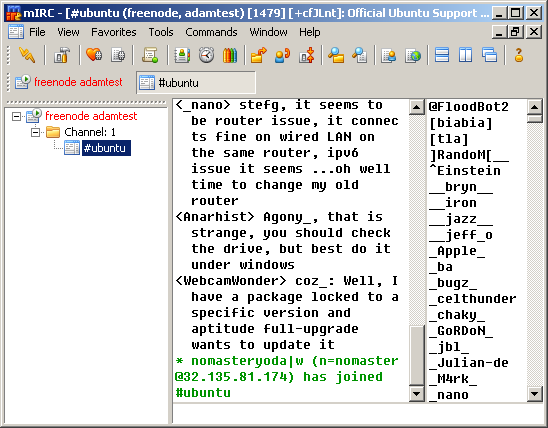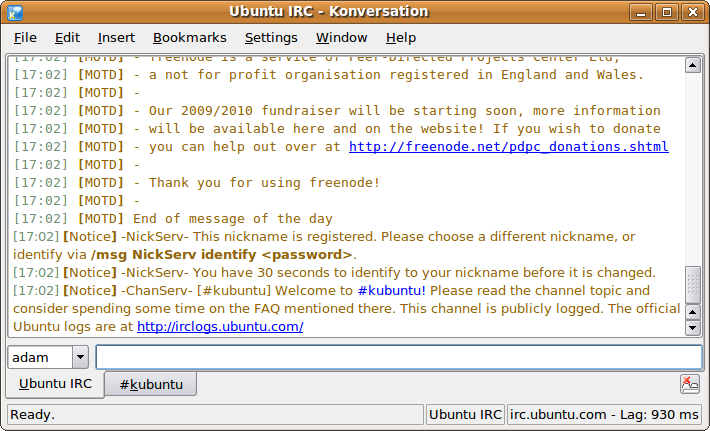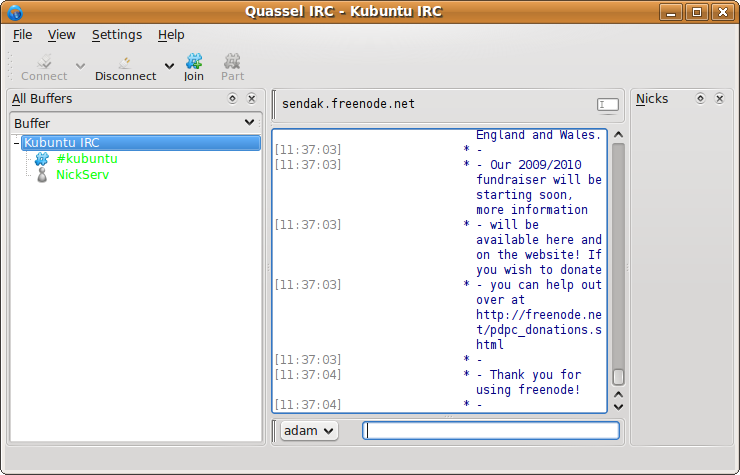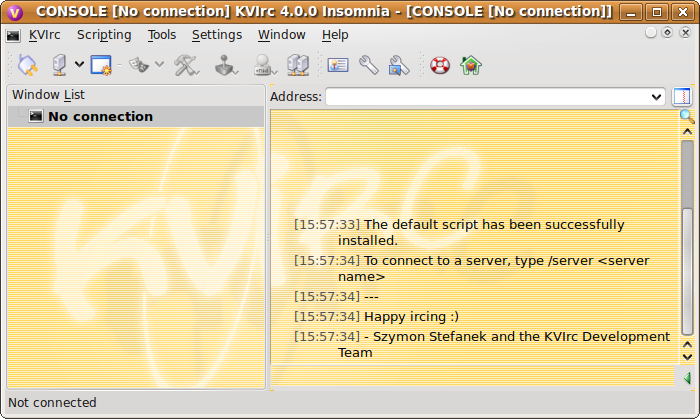Tom's Definitive Linux Software Roundup: Communications Apps
Large IRC Clients
IRC began to catch on in the late 80s and early 90s, making it the oldest form of instant messaging still popular today. The apps in this section (and the next) are strictly Internet Relay Chat (IRC) clients. They are not instant messengers that simply handle IRC as well. I used the official Ubuntu IRC channel (#ubuntu at irc.freenode.net) to test whether or not these clients functioned.
The listings on this page are feature-heavy IRC clients. Most have a GUI option for essentially any action, which can make them more approachable to beginners. These apps also tend to leave a larger footprint on both disk space and system resources than those on the next page. Their Windows-equivalent would be mIRC.
Konversation (v. 1.1)
As you might have guessed, Konversation is the default IRC client for KDE and this client is not lacking in options. Tabs are located at the bottom of the interface, so you can have multiple channels open at once. For preferences, you can change the color of pretty much every component on the screen. Even though the default is black text on a white background, you can set up the Matrix-inspired neon green text on a black background with minimal effort. You can also add and remove navigation bar (called toolbar) items a la Firefox. Bookmarks also work identically to those in a Web browser.
Konversation's 'pausing' system is the standard scroll-up. If the scrollbar is positioned at the bottom, the window will continue to scroll down as new text is added. Simply raising the scrollbar above the bottom will pause the chat, allowing you to read text at your leisure without fighting the scrollbar. Returning the scrollbar to the bottom will re-enable auto-scroll. This app also lets you manage multiple identities, each with multiple nicknames. There are even options for configuring custom keyboard shortcuts. Konversation manages to incorporate a sickening number of options, yet somehow still manages not to overwhelm the user. I'm giving Konversation the top spot for its straightforward, yet feature-rich interface. You'd be hard-pressed to find a better option on any platform.
Quassel (v. 0.4.1)
First off, there are two versions of Quassel in most repos: a client-only version and a client/core combo. This covers the client/core combo, since the client-only version requires the user to manually set up the Quassel server, in which some command line work is involved.
Get Tom's Hardware's best news and in-depth reviews, straight to your inbox.
This is a fully-featured IRC client with tons of options. You can adjust the color scheme, manage aliases, set keyboard shortcuts, and do minor modifications to the interface. The basic three-pane layout is used, making Quassel easy to pick up for anyone who has ever used a graphical IRC client before. Even new users should have no problem connecting to servers and finding channels using the GUI tools for server presets and channel lists. Since version 9.04, Quassel is the default IRC client for Kubuntu.
KVirc (v. 4.0.0)
KVirc has many option settings, which is great (unless, of course, you're new to IRC and/or KDE).
There is also the issue of this app's look and feel. First of all, it has a splash screen and many instances of pictures set as window backgrounds. Thankfully, there are no obnoxious system sounds. There is a pervasive default background, an irritating beige slab with 'KVirc' written graffiti-style in white, that ends up becoming very distracting. Fortunately, this app has Configure Themes and Manage Themes options under Settings in the menu bar.
On the other hand, a quickly-accessible bookmarking system is lacking. KVirc also crashed multiple times on my test system's 64-bit Ubuntu installation. By running KVirc in the VM installs of 32-bit Ubuntu and Kubuntu I've managed to narrow down the buggy behavior to both 64-bit and GNOME issues. It didn't crash in the 32-bit edition of Ubuntu, but ran much faster in Kubuntu. KVirc has a ton of options, but doesn't organize them in a logical and easy-to-access fashion. In fact, everything with this app seemed clunky, and I often found myself trying to figure out how the developers intended me to navigate menus and apply changes instead of just doing it. Simply put, KVirc fails where Konversation succeeds.
-
mitch074 I'd like to add something to the article...Reply
- Skype for Linux is currently in version 2.1 (beta) which differs from 2.0 (final) only in the fact that it is now able to deal with ALSA, OSS and PulseAudio transparently - and it doesn't wreck webcam outputs as much.
- Skype for Linux has supported video ever since version 2.0 (beta); it does work quite well if your webcam sends uncompressed video to the system (if your webcam streams MJPEG and you have a 2.6.28+ kernel, you will need some hacker-fu; details on demand)
- a quite well known single protocol IM is aMSN, which is also multiplatform; its other main advantage is that it supports voice and video chats. However, it's not always very stable and requires manual setting up of a TCP port for video and voice to work properly. -
How about benchmarking the applications. Which ones use more ram vs. functionality? How about responsiveness and stability? Those are questions I would like to see laid out because much of the Linux user base have older hardware and don't like things eating away their CPUs and ram.Reply
-
oralward You should really cover something with kde desktop as only because of protest by gnome users is it still the default desktop in any of the three versions you are covering. Its also easier for someone coming from windows. There is a version of ubuntu called Kubuntu that uses kde. This is the other main desktop.Reply -
Great article.Reply
As far as KDE vs. Gnome, I see no problem with the current format, maybe just do a Ubuntu(Gnome) vs. Kubuntu(KDE) vs. Xubuntu(Xfce) vs. MoonOS/OpenGEU/JAD(Enlightenment) roundup, to show off the different desktops(and the few apps that only work on a particular desktop). Any look good with the right theme and some Compiz/Beryl, but KDE and Enlightenment have an edge right out of the box. -
rrockman It's... "Surprising" that you didn't analyze Mercury, one of the most advanced multi-account IM apps.Reply -
haplo602 ah gui only options ... well have a look at CenterIM when you have time. It's a great little IM tool that runs in the terminal. This way I can get to my client everywhere with just a simple ssh client :-)Reply -
"The one major protocol that Empathy supports and Pidgin doesn't is the increaasingly-popular Jabber."Reply
This is just plain wrong. Pidgin has supported Jabber for a long time. It's called XMPP in the later versions which is the name of the protocol used by jabber clients -
rdawise Again, I praise Mr. Overa's coverage of Linux. I am looking forward to the Games section of Linux since I don't have much experience with native games.Reply -
jppayne2 "My major problem with Thunderbird is that it will continually ask for confirmation to ignore a security certificate every time it checks for new mail, by default, every ten minutes. Most of the other clients in this roundup give you the option to always accept or ignore."Reply
Actually, Thunderbird allows you to permanently accept the certificate, which will do what you want. Just pay attention when the confirmation dialog comes up, and select "Accept this certificate permanently". It's the first option (the default is the second option, which is to accept the certificate for the current session).




















